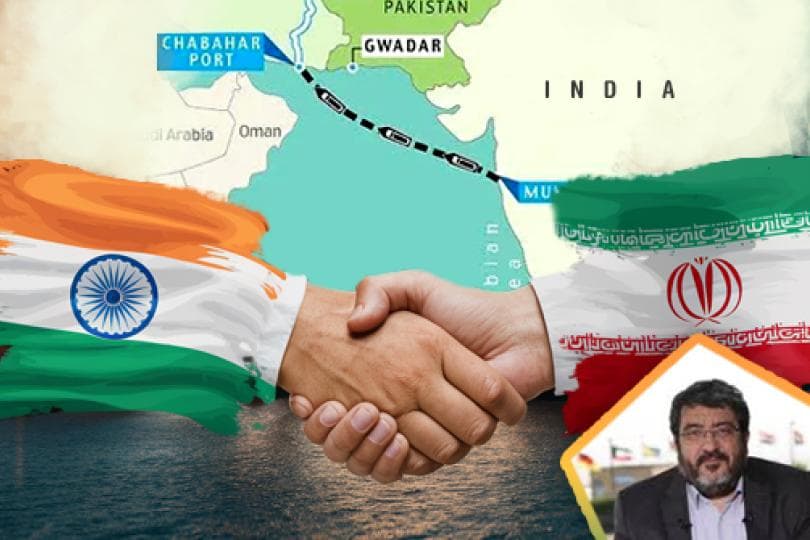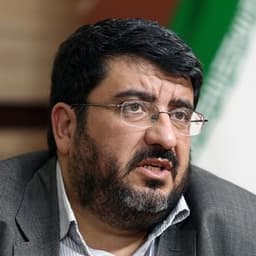Chabahar Deal: India Sidesteps Rivals, Expands Geopolitical Influence
India funds $250M for infrastructure development of the strategic Iranian Chabahar Port in Gulf of Oman

In a significant development, India has entered into a 10-year agreement with Iran for the development and operation of the Iranian port of Chabahar. The accord between India and Iran heralds a significant stride towards bolstering economic and political ties in the region, particularly with Central Asia and Russia. Through a decade-long agreement focused on the development and operation of the Chabahar port, India reinforces its commitment to fostering robust connectivity and trade routes. This pact holds immense promise as it leverages Iran's strategic position as a conduit for India's access to Central Asia and Russia via the North-South corridor.
Some years back, an agreement was signed, but it wasn't fully put into action. Now, with India's growing economy and stronger ties to Central Asia and Russia, Indian leaders see the importance of taking Chabahar more seriously. India's expanding economy also presents a wealth of opportunities for its neighbouring nations, with Iran poised to reap substantial benefits as a pivotal transit point. The palpable enthusiasm from Iran to fortify economic linkages with Central Asia and Russia underlines the mutual gains inherent in this collaboration. Moreover, the burgeoning rapport between Iran and Russia accentuates the imperative of forging a seamless link between India and Russia. This mutually beneficial agreement is poised to yield manifold advantages for India, Russia, and Iran, underlining a shared commitment to fostering regional prosperity and cooperation.
India's flourishing economy is poised to ascend to the forefront of global economic power in the coming decades, potentially eclipsing even the United States. In light of this trajectory, the Indian government understands the paramount importance of fostering robust diplomatic ties with proximate nations to keep the economy engine bustling. Hence, strengthening relations with countries across Asia, Central Asia and Russia, emerges as a strategic imperative. The decision to intensify engagement with the Chabahar port signifies a pivotal step in this direction. Recognising the strategic significance of Chabahar as a gateway to Central Asia and Russia via the North-South corridor, Indian leaders are seizing the moment to deepen their involvement.
With China's perennial interest in the region, India's proactive stance serves as a strategic countermeasure, aimed at safeguarding its interests and consolidating its influence. India's proactive approach towards Chabahar reflects a calculated move to assert its regional presence, capitalise on burgeoning economic opportunities, and strategically counterbalance China's influence, thereby affirming its emergence as a formidable global player in the years to come. Simultaneously, Iran sees Chabahar as a service to its geography, aiding India's connectivity with Central Asia and Russia along with increasing regional cooperation that would counter-historical interference by the US and foster regional stability.
India's remarkable economic growth trajectory necessitates diversifying its sources of revenue, prompting a strategic focus on expanding into new markets. With India's defence exports witnessing a significant upsurge, exemplified by Russia's substantial $4 billion purchase of Indian military equipment, the imperative to sustain and augment this momentum becomes increasingly apparent.
In this context, the Chabahar port stands out as a crucial element of India's strategic vision. By embracing Chabahar as a gateway for expanding its defence exports, India demonstrates a proactive commitment to economic diversification and regional engagement. Leveraging the port's potential, India seeks to address the rising demand for its military hardware while simultaneously fostering mutual prosperity and stability across the broader Asian region.
The port's significance is further underscored by Iran's favourable disposition towards India, viewing the nation as a robust economic partner. It's beneficial to reside in a prosperous neighbourhood rather than an impoverished one. As the wealth of Asian nations increases, the advantages extend to all inhabitants of the region.
The bilateral ties between India and Iran carry significant weight, particularly evidenced by the notable increase in trade between the two nations in recent years. With Iran expressing hopes for India to augment its purchases of Iranian oil, there exists a mutual aspiration to deepen economic cooperation and foster stronger ties, this is reflected in the type of economic relations that exist between the two countries today. As India assumes a more prominent role in managing the Chabahar Port, the foundation for even deeper collaboration and synergy between the two countries is laid, promising a future marked by heightened prosperity and mutual goodwill.
India's adept navigation of Iran's and Russia's strained relationship with the United States underscores its commitment to safeguarding its national interests while upholding principled foreign policy tenets. India exhibits sagacity in its diplomatic endeavours by maintaining a delicate balance in its myriad bilateral and multilateral relationships. The Indian government's discerning approach reflects its commitment to charting an autonomous foreign policy trajectory, indicative of its strategic autonomy and sovereign prerogatives. India's steadfast adherence to an independent foreign policy ethos fortifies its sovereignty and suits it well for fostering constructive engagements and partnerships on the global stage. India's diplomatic acumen and relentless pursuit of its national interests affirm its rightful trajectory towards consolidating its position as a discerning and influential player in international affairs.
India's ambitious plans to transform the Chabahar port into a bustling transit hub along the international North-South transport corridor (INSTC) signify a visionary leap towards expanding its global footprint. By leveraging the strategic location of Chabahar, India aims to forge enhanced trade connections with Commonwealth nations and beyond. Recognising the imperative to diversify its trade relations beyond traditional partners like China, Japan, and Korea, India's strategic focus on tapping into the vast potential of Central Asia, Russia, and Europe via the INSTC holds immense promise. The establishment of Chabahar as a pivotal node along this corridor not only facilitates seamless access to these regions but also catalyses India's engagement with the Persian Gulf and Arab nations. Chabahar's significance as a gateway to multiple regions underscores its pivotal role in bolstering India's international presence and fostering robust economic ties. By establishing a prominent presence at the port, India not only amplifies its connectivity with Asian countries but also consolidates its position as a key player in the global trade landscape.
The agreement between India and Iran holds promise not only for economic prosperity but also for fostering peace and stability in the region. Iran's emphasis on cooperation with India showcases a commitment to regional harmony, avoiding unnecessary competition with neighbouring countries like Pakistan or China. As economic ties between India and its Asian counterparts deepen, particularly amid historically strained relations with Pakistan, there emerges a tangible pathway towards promoting peace. Indeed, the growing economic interdependence among Asian nations fits well for fostering mutual understanding and collaboration, mitigating the potential for conflicts. Indians' inherent inclination towards peace is palpable, with a prevailing sentiment favouring dialogue and cooperation over military confrontation. The economic collaboration facilitated by the India-Iran agreement holds the potential to catalyse peace-building efforts in the region. By prioritising cooperation and mutual prosperity, stakeholders can chart a course towards a more stable and harmonious future, reflective of the shared aspirations of all nations involved.
India-Iran relations, rooted in historical ties and cultural affinities, are poised to ascend to even greater heights in the future. These enduring connections, evidenced by shared language, culture, and religious ties, form the bedrock of a robust partnership between the two nations. The rich fabric of historical cooperation between India and Iran is exemplified by artefacts such as Persian manuscripts housed in Indian museums. I recall visiting the Red Fort in New Delhi, where manuscripts in Persian were on display, allowing me to read what was available in the museum, a privilege that some Indians may not have had if they were unable to read Farsi(Persian). These historical ties are accompanied by shared words, culture, and religious connections. highlighting a shared heritage that transcends borders. These deep-rooted cultural bonds not only foster mutual understanding but also serve as a solid foundation for enhanced political and economic collaboration.
The convergence of economic, political, and cultural linkages between India and Iran fits well for strengthening their bilateral relations. By intertwining these facets, leaders from both nations seek to maximize economic benefits and also ensure the resilience and durability of their partnership. As both countries continue to deepen their engagement across various domains, the prospects for enduring friendship and cooperation between India and Iran are poised to flourish.



































